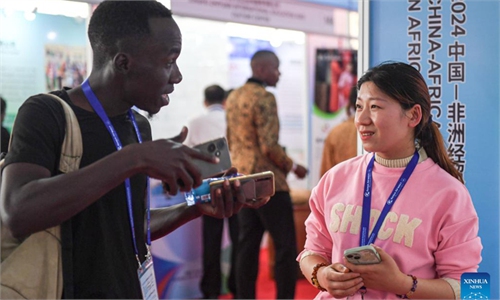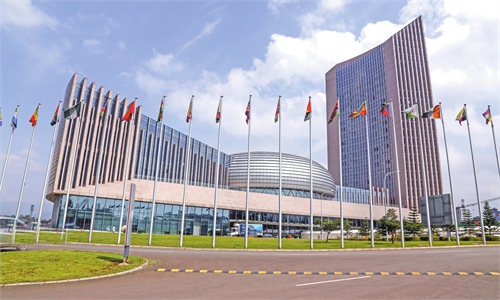FOCAC summit illustrates South-South cooperation
BRI, green industry, AI key areas of China-Africa collaboration: scholar

Local people inaugurate the official launch of the China-built Mombasa-Nairobi Standard Gauge Railway in Kenya that connects Nairobi, the Kenyan capital, with the coastal city of Mombasa, on May 30, 2017. Photo: VCG
The 2024 summit for the Forum on China-Africa Cooperation (FOCAC) is scheduled to take place in early September in Beijing. In a world marked by rising geopolitical tensions and economic uncertainties, the summit will likely signal a commitment to a multilateral approach based on mutual respect and shared interests. As global powers become increasingly polarized, the China-Africa partnership offers an alternative model of international relations, one that emphasizes South-South cooperation and rejects the zero-sum mindset often seen in North-South interactions.This forum could serve as an example of how developing countries can work together to accomplish shared objectives, such as economic diversification, poverty reduction, and sustainable development, without being influenced by outside agendas or pressures. The forum may also emphasize how crucial it is to preserve security and stability via communication and collaboration as opposed to military alliances or aggressive tactics.
The FOCAC summit holds great significance for the African continent's future. It will likely to build on previous achievements and pave the way for future cooperation between China and Africa. The China-proposed Belt and Road Initiative (BRI), which has already significantly improved Africa's infrastructure, will be one of the key topics of discussion.
One example of BRI cooperation fruits in the past decade is the building of railways in Africa, including the China-built Mombasa-Nairobi Standard Gauge Railway in Kenya that connects Nairobi, the Kenyan capital, with the coastal city of Mombasa. Those BRI projects have driven Africa's trade with China and within Africa in addition to improving connectivity.
As such, the FOCAC summit is anticipated to focus on traditional infrastructure projects, particularly in energy and transportation sectors which are crucial for Africa's industrialization and integration into the global supply chain. It will also be necessary to examine ways to improve bilateral trade facilitation, such as reducing non-tariff barriers, streamlining customs processes, and developing industrial parks that may operate as hubs for exports and manufacturing. There will be also a greater emphasis on renewable energy and green infrastructure projects because of the global push toward sustainability. These initiatives align with Africa's development needs and the implementation of China-proposed initiatives.
Digital, AI tech cooperation
Meanwhile, collaboration between China and Africa in artificial intelligence (AI) and digital technology has the potential to be revolutionary. Some of the African development problems can be addressed with the help of China's AI tech breakthroughs.
For example, precision agriculture powered by AI has the potential to significantly increase food security by maximizing crop yields in climate-affected areas. One instance is the partnership between African governments and Chinese tech companies to apply AI technologies in agriculture, like drone technology for crop and soil condition monitoring.
The application of AI in healthcare can help telemedicine services grow, particularly in isolated locations with limited access to medical specialists. African healthcare systems can benefit from China's experiences in using AI to detect and manage diseases early on. AI can also improve educational chances by creating tailored learning platforms that can adapt to the various needs of African students in various languages and geographical areas.
Furthermore, many AI applications will only be possible with the expansion of digital infrastructure, such as 5G networks. African nations can benefit from China's experiences in developing and implementing digital infrastructure, and this cooperation could boost African countries' technological capabilities and open new avenues for social and economic advancement.
Ahead of the summit, there have been some false narratives around China-Africa BRI cooperation, such as the so-called "debt trap," "neo-colonialism," and stigmatization of digital cooperation. They are often driven by external interests that seek to undermine China-Africa's booming partnership, and those doomsayers need to form a systematic approach to understand the situation.
Unlike the exploitative practices of historical colonialism, China's engagement with Africa is based on mutual benefits, and is voluntary. The BRI has facilitated the transfer of technology and skills to African workers, enhancing local capacities and creating jobs. It is also critical to understand that China's and Africa's digital cooperation aims to close the digital divide and advance digital inclusion.

Toumert Al Photo: Courtesy of Toumert Al
Experience from China
African nations, especially Morocco, learn a lot from China's economic development, notably its initiatives for rapid industrialization and poverty alleviation. The significance of infrastructure development as the cornerstone of economic growth is among the most important lessons they have learned. China has connected its large territory, lessened regional differences, and fostered an atmosphere that is favorable for industrial activities thanks to its enormous investments in ports, railroads, roads, and energy infrastructure.
For instance, Morocco could benefit from adapting China's model of Special Economic Zones to attract foreign investment and boost exports. The Tangier Free Zone located south of the city of Tangier is a step in this direction, and a further expansion and integration of such zones with infrastructure projects could enhance Morocco's position as a gateway between Africa and Europe.
Moreover, China's emphasis on education and skill development can be a guiding principle for African nations. By investing in vocational training and higher education, African countries can develop a skilled workforce that is essential for supporting industrialization and innovation. China's experience in leveraging technology and innovation for economic growth also offers valuable insights for Africa. The digital economy, which has become a pillar of China's growth, can be a model for African countries seeking to diversify their economies beyond traditional sectors.
African nations must, however, modify these tactics to fit their particular environments. Attempting to replicate something directly might not work because of the socioeconomic and cultural disparities between China and the African countries. Rather, these lessons must be modified to fit local circumstances, guaranteeing inclusive and sustainable growth.
The article was compiled based on an interview with Toumert AI, the General Secretary of the China Morocco Friendship Association and advisor to the World Green Design Organization



